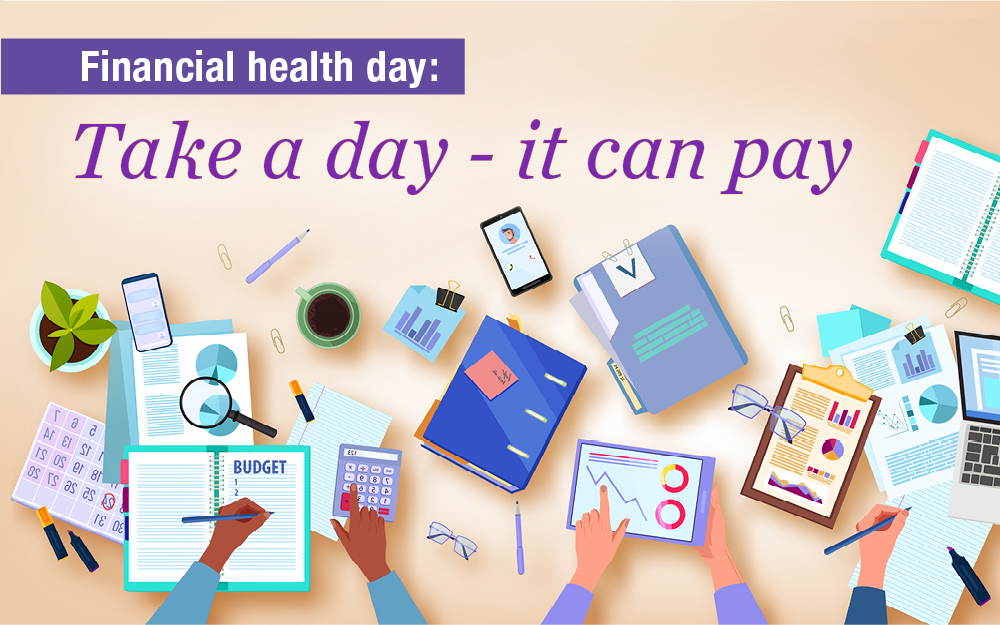ACT’s Professional Advantage: Save $70,000+ in Australia’s Most Stable Market
The Australian Capital Territory offers first home buyers a unique combination of Australia's most stable employment market and strategic...

Ever thought about taking a break from your routine, a “Financial Health Day” to spend some time tightening up your personal finances?
While it might not be the most exciting day you will ever spend — unless the thought of saving a significant amount of money excites you, it will be worth your while.
It should be a weekday so you have scope to call banks, credit card issuers, health insurers, and other financial service providers who are easier to contact during office hours. And you will also need all your tools — financial records, current tax return, mortgage, credit card and bank statements — close at hand. Internet access is also important as there are many things you can do online.
So, what are your objectives? Well, there are two sides to this coin. The first objective is to put more $$ in your pocket by saving a little more and spending a little less of your income, without making your life a penny-pinching misery in the process. The second is to discover some cheaper ways, if they exist, to pay for some of life’s essentials.
Start at the beginning by reviewing your monthly budget — or constructing one, if necessary — so you can pinpoint the big expenses before trying to pare them back. Take your power bills, for example. Some power companies will not only reward you with a discount for combining your gas and electricity, they will also allow you to pay them with a pre-set monthly direct debit, avoiding the shock of that big quarterly hit and smoothing your cash flow.
Monthly payments or saving targets can be an excellent budgeting tactic. In fact, you can even create your own monthly debit system for major expenses such as school fees, annual holidays and Christmas by estimating the cost and transferring monthly instalments to a separate savings account. Your bank can probably make the transfers for you automatically.
If you can manage it painlessly by cutting one or two unnecessary expenses, one good outcome of a budget review would be to save an extra 1 per cent of your salary — just $1 out of every $100 you earn — for a major objective like an overseas trip, new carpets or as a reserve fund. The best budgets can be wrecked by unexpected emergencies, whether it is a burst water heater or an unexpected mortgage rise.
Once you have your budget review completed and have set up new direct debits and/or opened one or two new dedicated savings accounts, you should still have a few hours of your Financial Health Day left to look for some significant savings on financial services.
Credit cards are a black hole in many budgets. Could you save by switching to a cheaper card? Are you paying off your card within the interest-free period? What about rewards programs — if you are paying for them, are you using them? Some supermarket reward programs now offer a “double reward” so it may pay to investigate your options. You can compare cards online at several sites such as www.creditcard.com. And if you do decide to change card companies, you might find one that will give you an interest rate holiday for the first 3–6 months as a reward for switching.
Your private health insurance plan is also worth reviewing because your family circumstances might have changed since you took out the plan, or the market may have newer, more flexible options. Choice health insurance experts have found that you can save up to $932, by comparing and switching funds.i (See www.choice.com.au or www.privatehealth.gov.au)
And finally, when was the last time you reviewed your home loan and your current interest rate? We can help reassess whether your current home loan still suits your circumstances and find not only the best interest rate but the most appropriate home loan to meet your current needs.
All done? Congratulations on a good day’s work!

With property prices continuing to rise across the country, it’s becoming much harder for many Australians to take that first step onto the property ladder.
Even though interest rates are at historic lows, it is still increasingly difficult for young families or first home buyers, in particular, to save for a home deposit. Unfortunately, as property prices continue to increase, so does the amount you need for a deposit.
In early 2020, it was predicted that house prices would increase, then we were hit with COVID-19 in early March 2020. The market contracted for a very short period; however, it bounced back relatively quickly with no sign of slowing down.
Whilst government support schemes like JobKeeper and JobSeeker appeared to alleviate some of the financial pressure on families during 2020 and early on in 2021, it didn’t make it any easier for first home buyers.
Property prices continue to increase at an alarming rate and the majority of first home buyers are being priced out of the market. With metropolitan areas becoming more unaffordable, some are making the decision to buy a property further afield in the outskirts of major cities, or regional and rural areas.
To assist first home buyers to get into the property market, the Australian Government introduced the First Home Super Saver Scheme (FHSSS) in the 2017-2018 Federal Budget.
The FHSS scheme allows first home buyers to use their super to accelerate their savings, which can then be released and used towards a home deposit. The key advantage of this scheme is you’ll be using the same tax-effective method to save for your deposit, that is used for your superannuation. Your income will be taxed at 15%, which for most people, is lower than your ordinary tax rate.
First home buyers can make voluntary personal super contributions of up to $15,000 per financial year, then withdraw these super contribution amounts (plus associated earnings/less tax) to assist with a deposit for a home.
Before making any additional contributions to your super, you will need to make salary sacrificing arrangements with your employer, as well as check whether your nominated super fund will release the funds when you need them.
If you’re eligible, the maximum amount that can be withdrawn is $30,000 for individuals and $60,000 for couples. From 1 July 2022, the government has proposed to increase the maximum withdrawal amount to $50,000 per person.i This has not yet been passed by law.
Certain criteria need to be met to be eligible for this scheme, which is outlined below:
Once you have saved the necessary amount in super, you will need to apply to the Australian Tax Office (ATO) for a determination and a release. You can visit the ATO website to make an application.
Before this request to make an application of withdrawal, you will need to obtain a ‘determination from the ATO’ which you can do through your myGov account. This will determine how much you are able to withdraw under this scheme.
Even with property prices predicted to rise for the foreseeable future, having a savings goal is key when it comes to saving for a home deposit.
Using the government’s FHSSS is a great way to start and can help you achieve your savings goal sooner but by creating a savings budget, this will also help you understand exactly where your money is being spent and where you can curb your spending – do you really need to buy lunch every day?
If you’d like to find out how much you may need for a house deposit or how to begin saving, call us today and we can get you closer to owning your own home.
Stay up to date with the latest developments in the property market over the past month.
Our video takes you through an overview of the state of the property market, including a breakdown across all capital cities of the changes in dwelling values over the past month, as well as over a period of 12 months.
Please click here to get in touch if you’d like assistance finding the right loan for your situation.
When you start dotting the capital growth in the last 10 years of those areas, you start seeing that ripple effect in action and you start seeing that pricing pressure where you find that affordability does become an issue for people and they move into the next suburb.
So if you’re talking about your concerns about population growth and employment, I would be less concerned about that. But I would be more concerned about finding the opportunity of where the next kind of hotspot is.
I would be less concerned about the population growth and employment but more interested in targeting where you can make the most money and the most profit which is anticipating that next area that takes off.
Download the ebook buying process to know more about it. Don’t make the common mistakes that could cost thousands of dollars.
https://investorschoice.com.au/buying-process/
#sourceit #propertyinvestment #mortgagebroker #buyingprocess

Stay up to date with the latest developments in the property market over the past month.
Our video takes you through an overview of the state of the property market, including a breakdown across all capital cities of the changes in dwelling values over the past month, as well as over a period of 12 months.
Please click here to get in touch if you’d like assistance finding the right loan for your situation.
The Australian Capital Territory offers first home buyers a unique combination of Australia's most stable employment market and strategic...
The Northern Territory offers Australian first home buyers the most generous grant support in the nation, with the HomeGrown Territory...